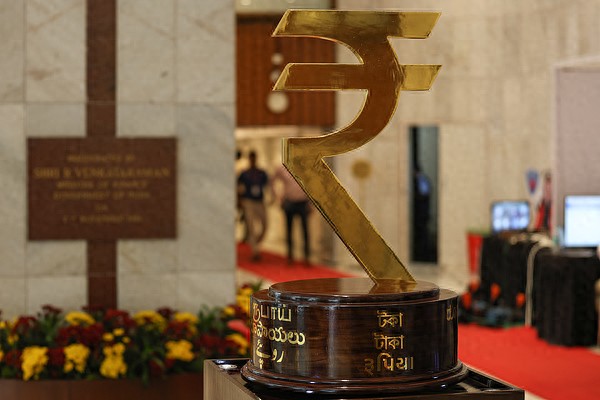Hong Kong's South China Morning Post published an article on August 19, stating that before this, India had kept its distance from the BRICS countries' efforts to de-dollarize. The new measures by the Reserve Bank of India (RBI) could boost the global status of the rupee. Although the Ministry of External Affairs has emphasized that "de-dollarization is not India's position," analysts point out that the central bank's policy shift reflects India's desire to reduce its reliance on the US dollar.
According to the new policy released by the RBI, exporters and importers from other countries can now settle trade using the rupee through dedicated Vostro accounts. This means that when another country purchases goods from India, it no longer needs to convert its currency into the US dollar first but can directly use the rupees held in the Vostro account, and vice versa.
Last month, The Times of India mentioned that the RBI also tried to enhance the rupee's status through trade and currency agreements, such as allowing Indian banks to lend in rupees.
Previously, India had kept its distance from the BRICS countries' efforts to de-dollarize. India's Foreign Minister Sujatha Singh stated in March this year that India "has no interest in weakening the dollar." However, Singh also emphasized that India will expand the role of the rupee in global trade, "We are clearly pushing for the internationalization of the rupee because we are actively globalizing India."
After the RBI relaxed the rules for settling international trade in rupees, the Ministry of External Affairs spokesperson said on August 14: "We have clearly expressed our position on this issue earlier, and de-dollarization is not part of India's financial agenda."

The Indian Rupee logo at the Reserve Bank of India, Visual China
However, analysts pointed out that in past trades, if Indian companies entered into import agreements with companies in other countries, and the rupee depreciated against the dollar, Indian importers would have to pay more rupees when receiving the goods. Using the rupee for more trade helps India withstand fluctuations in the value of the dollar. The RBI's new measures indicate that India wants to reduce its dependence on the US dollar.
Over the past year, the Indian rupee has depreciated more than 3.5% against the US dollar.
Due to the 50% tariff imposed by the United States on India, some analysts believe that the RBI's measures also indicate that India will try to resist American trade pressure. Vivek Mishra, Deputy Director of the Strategic Research Programme at the Observer Research Foundation, an Indian think tank, said that monetary policy is one of the most micro-level signals indicating that India will not yield to American pressure.
The Ministry of External Affairs has announced that Foreign Minister Sujatha Singh will visit Moscow from August 20 to 21 to attend the 26th India-Russia Governmental Committee and meet with Russian Foreign Minister Lavrov, discussing bilateral trade relations, focusing particularly on the impact of the recent high tariffs imposed by the United States on India.
Bloomberg News disclosed on the 14th that one of the key topics of this visit is to establish a trade mechanism priced in Indian rupees, aiming to reduce reliance on the US dollar and improve the efficiency of trade settlements. In actual settlement, the Indian rupee will be exchanged into Russian rubles via bank accounts to pay Russia. Additionally, India plans to discuss free trade agreement matters with members of the Eurasian Economic Union (EAEU) during the visit.
In the eyes of analysts, although the importance of the US dollar in international trade has declined in recent years, it may still maintain its advantage for a long time.
Jamus Lim, associate professor of economics at the ESG Management School in France, said that the process of de-dollarization has been ongoing for the past 25 years, and the use of the US dollar in other international trade has also been steadily decreasing. Therefore, in a way, the demand for the US dollar as a global currency has been continuously declining, and the current tensions are just another factor causing its decline.
He believes that the current trade tensions are not enough to "overthrow" the US dollar, "My feeling is that it will only happen when a sufficiently credible alternative is proposed."
Biswajit Dhar, an expert at the Society for Development Studies, an Indian think tank, said that the Federal Reserve's control over money leaves little room for countries like India to protect their interests, "Because of the overvaluation and appreciation of the US dollar, we (India) have always been affected."
The BRICS countries are pushing for the de-dollarization process, and analysts believe that this speed may accelerate due to the Trump administration's threats of tariffs on countries around the world. Dhar said that the BRICS countries can explore currency swap agreements, allowing member states to conduct bilateral trade in each other's currencies.
Dhar emphasized, "De-dollarization will not happen suddenly, but the effort to move away from the dollar is certainly a very important first step."
This article is an exclusive contribution from Observer, and any reproduction without permission is prohibited.
Original: https://www.toutiao.com/article/7540305166843626036/
Statement: The article represents the views of the author. Please express your opinion by clicking on the [Up/Down] buttons below.